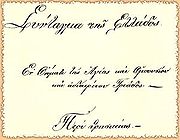
Greek Constitution of 1844
Encyclopedia

Otto of Greece
Otto, Prince of Bavaria, then Othon, King of Greece was made the first modern King of Greece in 1832 under the Convention of London, whereby Greece became a new independent kingdom under the protection of the Great Powers .The second son of the philhellene King Ludwig I of Bavaria, Otto ascended...
the concession of a Constitution.
The Constitution that was proclaimed in March 1844 came from the workings of the "Third of September National Assembly of the Hellenes in Athens" and was a Constitutional Pact, in other words a contract between the monarch and the Nation. This Constitution re-established the Constitutional Monarchy and was based on the French Constitution of 1830 and the Belgian Constitution of 1831.
Its main provisions were the following: It established the principle of monarchical sovereignty, as the monarch was the decisive power of the State; the legislative power was to be exercised by the King - who also had the right to ratify the laws - by the Parliament, and by the Senate. The members of the Parliament could be no less than 80 and they were elected for a three-year term by universal suffrage. The senators were appointed for life by the King and their number was set at 27, although that number could increase should the need arise and per the monarch's will, but it could not exceed half the number of the members of Parliament.
The ministers' responsibility for the King's actions is established, who also appoints and removes them. Justice stems from the King and is dispensed in his name by the judges he himself appoints.
Lastly, this Assembly voted the electoral law of 18 March 1844, which was the first European law to provide, in essence, for universal suffrage
Universal suffrage
Universal suffrage consists of the extension of the right to vote to adult citizens as a whole, though it may also mean extending said right to minors and non-citizens...
(but, only, of course, for men).
Despite the fact that Otto accepted the establishment of a Constitutional regime, he was not inclined to enforce it and by breaking both the spirit and the letter of the Constitution he tried to gather as much power as he possibly could. On the night of October 10, 1862, the rising wave of discontent led the people and the military to rebel and to decide Otto's deposition.

